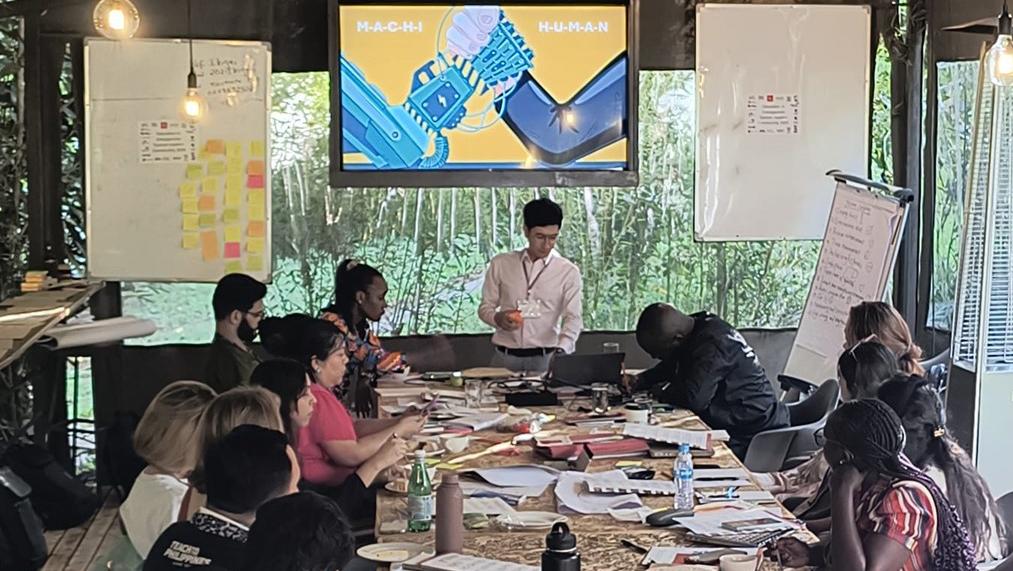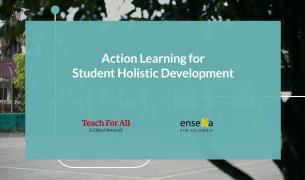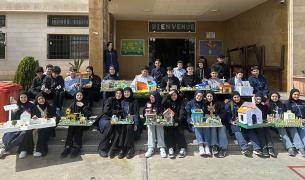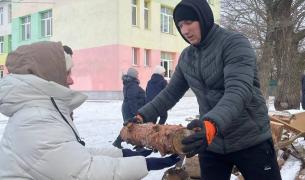Playing with disasters: An exercise in diplomacy for EiE system leaders

Lee esta historia en español
From my experience as a researcher and facilitator on resilience-planning with decision-makers, I have found that games can be powerful vehicles for learning, especially in complex contexts such as disasters. So I adapted Playing with Uncertainty, my doctoral dissertation game, to a new setting—Education in Emergencies (EiE).
At Teach For All’s Education in Emergencies System Leaders Summit in Nairobi, I ran an exercise where participants adopted different leadership roles and role-played their response to sample crisis situations. For example, one situation was set in Montes de Maria, Colombia, where violence disrupts rural education with threats, landmines, and the recruitment of children into armed groups. To respond, players had to decide how they would protect students and teachers, while promoting learning without losing neutrality. In another scenario, an earthquake strikes Bamiyan, Afghanistan, destroying schools and isolating Hazara communities. The challenge in this situation was to prioritise and allocate resources between education, psychosocial care, and gender equity in a complex ethnic and political context.
The game was played in groups of six people, with assigned roles ranging from school principals to humanitarian officials. We used dice to switch scenarios and roles, which allowed participants to experience multiple perspectives. Each participant had to argue their position and make decisions in real time. What started as a playful dynamic quickly turned into a real diplomacy experience—a laboratory of intercultural understanding and practical cooperation.
Those who took part came from all over the world, from Ukraine to Colombia, Bangladesh to Mexico, Zimbabwe to the Philippines, all with different backgrounds, facing the same challenge—to prioritise, negotiate, and collaborate in the face of an educational emergency. Inspired by Ilan Kelman's concept of “disaster diplomacy,” my intention was to create a space to practice educational diplomacy, where our local realities, funding constraints, and common hopes intersected. In that intersection, we discovered the power of collective leadership and working as a network.
This exercise was also the practical manifestation of a word I learned from my African colleagues: Ubuntu, or “I am because we are.” Sometimes it is hard to imagine how this global network that we are a part of can function in a specific, immediate situation. But here we did it: we met, we played, we debated, and we came together to figure out how to respond to an urgent problem. We discovered that collective leadership is not an abstract idea. It is a practice, a pedagogy, a path.
One of the biggest risks in Education in Emergencies is to restrict responses to a single "technically correct" response. Disasters affect diverse communities and require diverse solutions. Playing became an exercise in diplomacy because it forced us to listen, debate, represent different interests, and support locally-led solutions, against a backdrop of extreme time pressure and resource constraints.
This exercise shifted my perspective in ways I had not fully anticipated. Participants engaged so passionately with laughter, disagreement, and eventual consensus, so it reaffirmed for me that play is not merely a metaphor, but a method for surfacing wisdom and empathy in difficult circumstances. Conversations during and after the game revealed a real hunger for tools that help teams move beyond technical fixes and engage with the complex, human fabric behind every crisis!
Perhaps most importantly, the experience showed us the transformative potential of inviting collective imagination into crisis response. I am now exploring how to incorporate elements of this ‘disaster diplomacy’ exercise into regular trainings for EiE leaders, and experimenting with ways to use it as a structured debrief after actual emergencies. That is why we play—to understand different realities, to empathise, and to think of collective solutions. Playing, that was my call to action.


